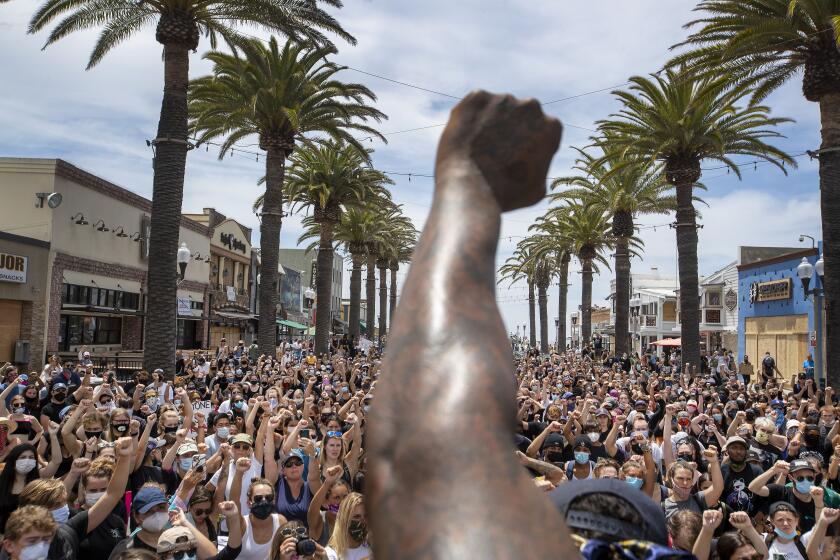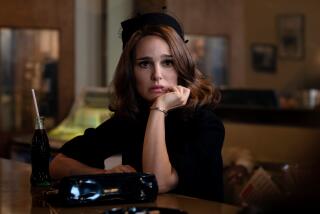Laura Lippman on facing the villain in the mirror
If you buy books linked on our site, The Times may earn a commission from Bookshop.org, whose fees support independent bookstores.
Laura Lippman is the author of some two dozen crime novels, 12 in the Tess Monaghan series and an equal number of stand-alone thrillers. Along the way, the former Baltimore Sun reporter has won every major U.S. mystery award. Why interrupt the flow of that career to publish a book of essays? During a candid phone conversation shortly before the release of âMy Life as a Villainess,â collecting recently published essays along with several new pieces, Lippmanâs answers revealed as much about book publishing as they did about the authorâs penchant for compelling and clever self-interrogation.
âIncreasingly, the marketing strategy for fiction writers is [for publishers to ask], âDo you think you can write some nonfiction and place them on some blogs and magazines?ââ she says. Instead of resisting on the grounds that her fiction speaks well enough for itself, Lippman leaned into the same impulse. Admiring younger novelists who approach book publicity âalmost like a military strategy,â she reached out to several of them, including Jami Attenberg and Taffy Brodesser-Akner, to help refine her pitches. Notwithstanding some writers (themselves essayists) loudly proclaiming the end of the online essay boom, Lippman found herself becoming a champion of a grand tradition.
At 61, Lippmanâs clear-eyed assessment of aging puts âMy Life as a Villainessâ on the same shelf as Nora Ephronâs âI Feel Bad About My Neck.â Lippman references Ephron, the celebrated essayist and filmmaker whom she calls âthe gold standardâ of essay writing, in a couple of her own pieces. But where Ephron, who died in 2012, advised women that the expiration date on their bikini wearing is about 34 years, Lippman is both more affirming and more profane: âWhat would happen to the global economy,â she writes in âThe Whole 60,â âif all the women on the planet suddenly decided: I donât care if you think Iâm âable?â Another truth comes by way of Susie Orbachâs âFat is a Feminist Issueâ: âEat what you want when you want.â
What crime novelist Laura Lippman is reading and watching in quarantine
In the laugh-out-loud âGame of Crones,â Lippman writes of becoming a mother at the not-so-tender age of 51. With 15 novels under her belt by then, youâd think she wouldnât be concerned about motherhood cutting into her work. You would be wrong. She worried it might be a âcareer-ender ... [T]he small coterie of crime writers with young children did end up slowing down their output if they were women.â But Lippman, who had just published her first New York Times bestseller, was undeterred.
In the new essay âNatural Selection,â Lippman addresses menopause. âI donât know why people think thereâs a conspiracy theory about coronavirus,â she jokes in our conversation. âIâm telling you, the information thatâs being suppressed is the information about menopause.â Did you know, for example, that this phase of life only occurs in humans and a handful of whale species? Now you do. Lippman also writes of midlife icons Madonna and Jennifer Lopez as well as her own journey of self-care â breaking taboos, she believes, simply by saying the âMâ word. âI feel like men donât want to hear about this, they find it icky,â she says. âBut it feels great to say the word âmenopauseâ 30 billion times!â
In addition to writing about healthy aging and raising her daughter with husband David Simon, the prolific showrunner she met when both worked at the Baltimore Sun, Lippman examines her past and present â deconstructing a friendship gone awry, the breakup of her first marriage, and her blind spots as a cub reporter in Texas. Thereâs an undercurrent of accepting culpability, of being (per the title) the self-identified villainess in her life.
In light of todayâs reassessments of institutional racism, an essay that resonated for me was âThe Waco Kid,â wherein Lippman takes herself to task for not knowing that the city was the site of one of the most infamous lynchings in American history.
Walter Mosley, Luis Rodriguez, the coiner of #BlackLivesMatter and others sketch a hopeful future for L.A. and the U.S. after George Floyd protests.
The Waco Horror, so dubbed in a seminal 1916 essay by W.E.B. DuBois, was not spoken of when Lippman lived in âthe buckle of the Bible Belt.â âHow crazy was it that, as a young reporter, I came to Waco in the 1980s and heard all about a 1953 tornado there,â she says, âbut I never heard about the fact that in the 20th century McLennan County had the second highest number of lynchings in the state.â Lippman, a lifelong Southerner born in Atlanta and raised in and around Baltimore, never wrote about the Waco Horror while at the cityâs Tribune-Herald, but on a trip to Waco in 2019, she made the connection between her youthful naivetĂŠ and more personal demons â including petty theft and troubling relationships with food.
âWhen you live in places where there is explicit racism and otherism,â she writes, âitâs super-easy to feel great about yourself, to postpone some essential introspection. In my twenties, I believed that I could say and do certain things as long as I did it all with a kind of ironic self-awareness. I was wrong. Boy, was I wrong.â
Lippmanâs memories and regrets over Waco led us to talk of Baltimore, which she came to know intimately when she returned in 1989 to cover crime and other beats for the Sun. (She left the paper to write full time in 2001.) I asked what she makes of recent politicized lamentations over cities like Baltimore, where murders have been trending higher than in 2019, itself a record year. âI canât imagine living any place but the city,â she declares. âIâm certainly not someone who wants to run away to the suburbs or the countryside.â Yet she acknowledges that the relationship between Baltimoreâs Black citizens and police is fraught.
Over the last three months, 17 writers provided diaries to the Times of their days in isolation, followed by weeks of protest. This is their story.
âItâs been five years since Freddie Grayâs deathâ at the hands of Baltimore police, she says. âSo I think the memory of that is still fresh. But we still havenât solved the issue of policing in our communities. When people start talking about defunding the police, that to me is a really complicated conversation when you live in a place like Baltimore. Part of the reason crime is up in Baltimore is because, in the wake of Freddie Gray, police officers donât want to get out of their cars anymore ⌠I believe thereâs a way to police cities that makes them safer and thatâs not happening in Baltimore right now.â
Lippmanâs honest assessment of the situation is a keen reminder that the former reporter, whose novels are often based on real events, is hardly a newcomer to nonfiction and its uncomfortable truths. But as she prepares for a digital tour of âVillainess,â she is back to working on fiction, finishing a stand-alone novel. That is, when she isnât busy home-schooling her daughter, now 10, working out with a virtual trainer and finding creative ways of coping with the pandemic.
For a time, she posted photos of herself on social media in pre-pandemic dress-up clothes â an antidote to the sartorial lassitude of quarantine. She also enjoys regular family movie nights, and is excited about her next pick, John Boormanâs classic, âHope and Glory,â which offers a childâs-eye perspective on the Blitz in WWII London. âI want my daughter to understand that people have been through really intense stuff in the world and that we are going to be OK,â she explains. âI think kids donât understand that theyâll get through this. And so I want her to see that, yeah, itâs a bitch and itâs a shame, but it will end.â
More to Read
Sign up for our Book Club newsletter
Get the latest news, events and more from the Los Angeles Times Book Club, and help us get L.A. reading and talking.
You may occasionally receive promotional content from the Los Angeles Times.









